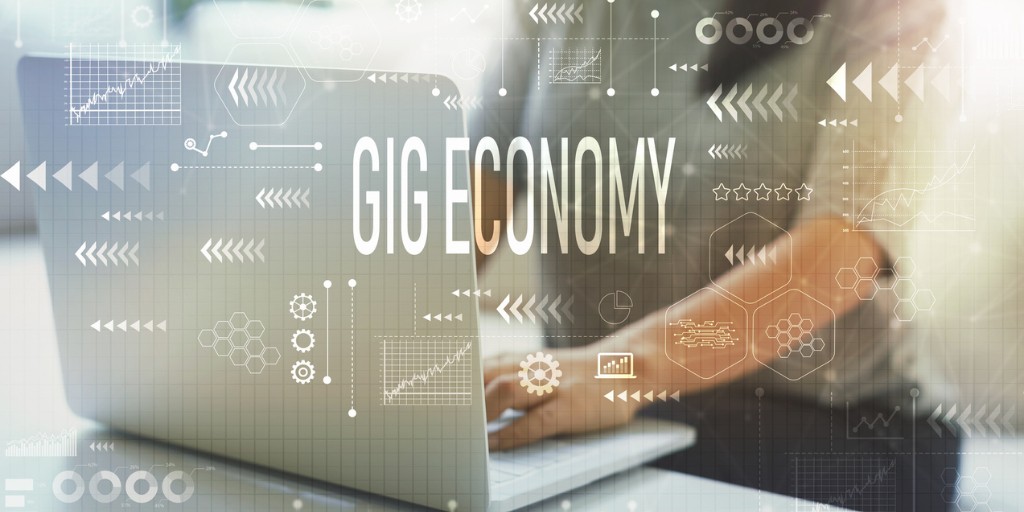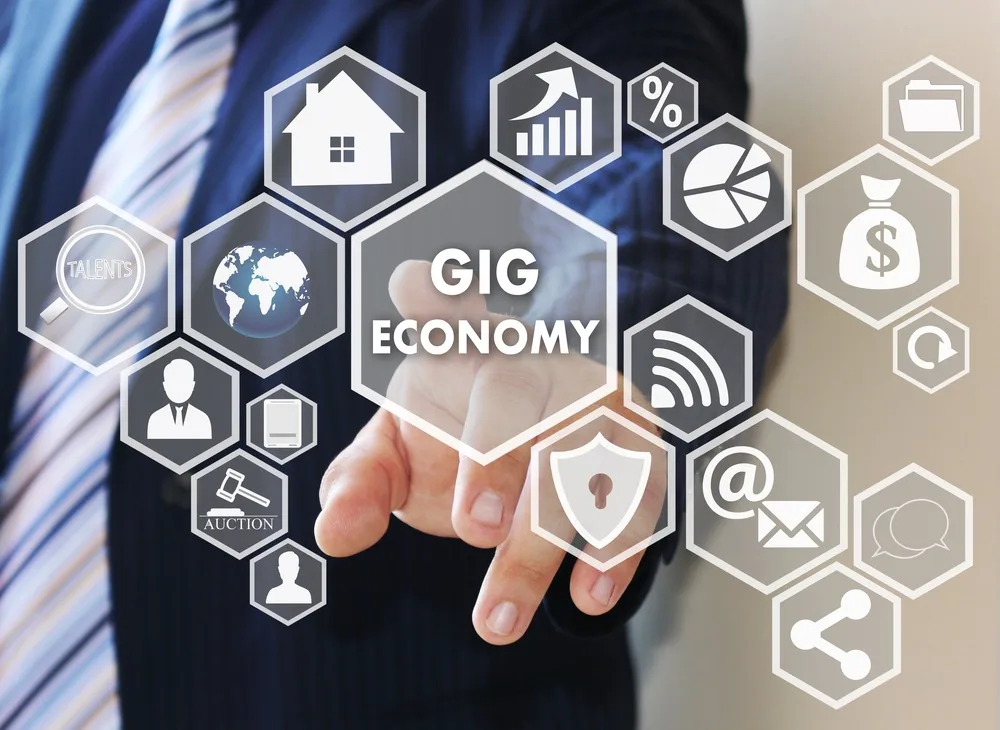How Does Fintech In The Gig Economy Enhance Payment Solutions?
The gig economy is the economic model formed by freelancers and independent workers. Today’s widespread digitalization has facilitated the transition of employees from almost every sector to gig economy models. The concept will become more and more popular in today’s economic structures, where the difference between “independent contractor” and “employee” is gradually blurring, as well as the increase in the number of freelance workers due to digitalization.
Employees who generally carry out their business operations from their own homes instead of working environments such as offices constitute the gig economy model. So, what is the importance of fintech in the gig economy?
However, the payments of individuals with this profession are closely related to fintech, unlike traditional salary payments. The concept of fintech is the whole of technologies and developments in the field of finance, and payment-related technologies are also called fintech solutions. Fintech in the gig economy is very important in terms of optimizing and accelerating payment processes.
Today, the vast majority of employees in the gig economy model receive their payments in more digital and innovative ways instead of bank transfers. These include digital wallets, online banking platforms, and cryptocurrency payments. For this reason, innovations and developments in the field of fintech directly affect employees in the gig economy. In this article, we will take a closer look at the function and operation of fintech in the gig economy.
What Is The Impact Of Fintech On The Gig Economy?

There are many examples within the scope of fintech in the gig economy. Individuals working in gig models can receive their payments faster and more practically thanks to fintech solutions. Many businesses can expand their commercial operations by accessing more than one gig employee thanks to fintech solutions and tools.
While employees receive their payments more easily and securely, businesses also have the chance to create quality teams working in this model thanks to fintech solutions. The gig economy is growing thanks to fintech solutions. With the spread of digitalization every day, gig models are needed in different units and departments of each sector. Especially after the pandemic, almost every sector has completely transformed the operation of at least a few departments to the gig model.
The importance of fintech in the gig economy will increase shortly because the gig model is becoming increasingly widespread. If fintech developments continue to be more sustainable and practical, the power of the gig economy will also increase. It is a type of economy created by people who make their living by taking part in short-term projects in a freelance manner, without being affiliated with any institution or organization.
In this economic structure, the worker (service provider) and the employer (service requester) usually meet through digital platforms where online job postings are shared. In this way, professionals such as painters, repairmen, cleaners, plumbers, taxi drivers can find jobs by utilizing fintech tools.
How Does Fintech Make Payments Easier For Gig Workers?
So how is it that fintech solutions and tools make gig workers’ payment processes easier and more practical? Gig workers and the gig economy are generally a way of working where employees and employers continue all processes digitally. This process also includes payments received in return for work. Thanks to fintech applications, gig workers can receive their payments much faster than traditional methods.
In addition, fintech in the gig economy provides great benefits not only in terms of receiving payments in return for work but also in other official processes. For example, creating invoices for businesses, which gig workers in private companies may also want to create invoices, being able to follow up on payments, being able to view payment history quickly and practically, and being mobile are offered many advantages.
Fintech in the gig economy should be remembered for many different advantages for both employees and employers. Employers or businesses can easily view payment and transaction history, create official invoice documents, and complete gig workers’ payments quickly thanks to fintech tools and applications.
What Are The Benefits Of Fintech For The Gig Economy?
I have said that fintech applications for the gig economy have countless benefits. In the gig economy model, which is one of the most common business models today, employees can manage the workloads given to them by the company without having to be in the company’s physical building or office.
Such an operation also requires that economic moves be made remotely and online. At this point, fintech applications offer great solutions. When considered from this perspective, the importance of fintech in the gig economy will be understood even better.
The benefits of fintech for the gig economy can be listed as follows:
- Gig employees can receive their payments faster compared to traditional methods.
- Employees can track their payments and income better.
- Both employees and businesses are freed from dependence on banks.
- Official financial processes such as microcredit and insurance can be managed quickly and online.
How Does Fintech Ensure Secure Transactions For Gig Workers?
Questions about security within the scope of fintech in the gig economy can also be asked by both gig workers and businesses. For example, how does a business that manages its financial processes entirely with fintech applications provide a secure financial process? How is fintech security provided for gig workers?
Fintech offers many different security measures digitally, unlike traditional banking methods and solutions. The most common of these can be remembered as two-factor authentication methods, advanced encryption technology, artificial intelligence-based verification and security technologies, and biometric verification methods. Thanks to these advanced and modern verification and login methods, possible fraud cases are eliminated thanks to fintech solutions.
Since fintech solutions are offered entirely with digital banking dynamics, the probability of fraud cases is very low. For this reason, both gig workers and businesses prefer to meet their commercial processes and financial needs with fintech applications instead of traditional banking solutions. After the pandemic, many companies all over the world continue to expand fintech in the gig economy model through fintech applications by opening up space for gig workers.
How Is Fintech Transforming Payment Solutions In The Gig Economy?

The gig economy is a business model and economy where employees and businesses are not physically present in the same environment, and the workload is given to gig workers online. In this widespread model, the payment process is usually completed through fintech applications.
Because fintech applications manage payment processes quickly and practically in accordance with the gig model thanks to their digital operation. Many solutions such as flexible salary payment, mobile payment options, digital wallet options, and the ability to trade with digital assets such as cryptocurrencies constitute practical examples of fintech in the gig economy.
Not only with traditional banking methods and fiat currencies but also with fintech applications, any determined asset transfer between gig workers and businesses is possible. Fintech in the gig economy is a haven not only for payment transfers but also for official processes such as invoice/bill creation.
What Are The Top Fintech Payment Solutions For Gig Workers?
The most popular payment solutions for gig workers in the field of fintech in the gig economy are offered by digital wallets. Today, there are many digital wallets that enable payments to be made on a global scale, such as PayPal, Revolut, and Payoneer, which are widely and popularly used.
Gig workers should determine the most suitable one for themselves. From time to time, businesses expect gig workers to open an account from one of these types of digital wallets. Fortunately, it is possible to open an account and receive payments from these types of digital wallets within seconds after identity verification.
These digital wallets attract great attention from both businesses and gig workers due to their low membership costs and fast and secure transactions. These types of digital wallets increase the functionality of fintech in the gig economy, as they offer services such as not only asset transfer but also invoice creation, tax tracking, reporting, and transaction history viewing.
How Can Gig Workers Manage Their Finances With Fintech?
Thanks to fintech solutions, gig workers not only receive payments but also have access to great tools for managing their financial processes. I had mentioned the management of financial processes as one of the benefits of fintech in the gig economy.
An individual working as a gig worker in a global business can view the payments they receive with these fintech applications. In this way, they can complete their financial processes such as creating a budget plan, benefiting from savings programs, and developing tax optimization online and mobile.
An individual working in the gig economy model can analyze her/his income and expenses, and implement savings programs in her/his expenses, just like traditional banking solutions. For this, the fintech application they receive their payments from will be sufficient. Many different fintech applications include solutions not only for asset transfers but also for these financial processes.
How Does Fintech Improve Income Tracking For Gig Workers?
Gig workers do not need to get service from a professional accountant/financial advisor to track their income. Many of today’s widespread and popular fintech applications also include income-tracking tools. Gig workers can regularly track and analyze their income through fintech platforms. In this way, it becomes easier to implement the necessary savings programs while achieving financial goals.
Fintech applications that provide payment history and work history data offer gig workers the chance to organize their finances as one of the biggest benefits of fintech in the gig economy. Remote software developers, graphic designers, and even psychologists (with online therapies) are included in the gig economy model.
In the gig economy model, where there are participants from almost every sector, both businesses and gig workers can manage their financial processes, including income tracking, successfully and comfortably thanks to fintech applications.
What Challenges Does Fintech Face In The Gig Economy?

Although fintech applications and solutions offer numerous advantages for gig workers and businesses within the gig economy model, I should remind you that they also include some challenges. Fintech applications may present some challenges on both the gig worker and business side.
One of the most common is the lack of regulation for gig workers. When fintech applications mostly offer innovative ideas and solutions, they may not be compatible with these old and traditional regulations. Although adaptation is faster in developed countries, banking regulations often do not include fintech solutions. This makes receiving payments difficult and troublesome in some countries.
Another common fintech in the gig economy challenge is security issues. Different banking regulations and local conditions in different countries can threaten the security of fintech companies. In such special cases, the survival of assets for gig workers and businesses may be at risk. Therefore, compliance with regulations is the responsibility of fintech application developers.
I can mention other challenges of the gig economy:
– Social security is a big problem for these types of workers. Since contracts are freelance service delivery, those who do the work are not considered employees.
– Especially organizations like hourly car rental and food delivery services that bind people to themselves with such heavy contracts that you actually become an employee there. But you do not have the social rights that employees have.
– Freelance workers have a weak tendency to organize. However, for example, in Europe, freelance workers organize as cooperatives and this works very well. Cooperatives and similar organizations need to become widespread
How Does Fintech Support The Growth Of The Gig Economy?
Today, especially after the pandemic, there has been a great increase in the number of gig economy and gig workers. The number of businesses that have partially or completely converted to the gig model is increasing in almost every country and sector in the world. Digitalization, in particular, greatly facilitates this transformation. So how do fintech solutions affect the growth of the gig economy?
Since fintech is an innovative technology consisting of applications and products where digital banking solutions are offered and financial technologies are developed, it facilitates the management of all financial processes needed in the gig economy model.
This means that it supports the growth of the gig economy by ensuring that more businesses and workers are included in it. Thanks to the speed and practicality offered by fintech, small businesses can collaborate more easily with gig workers. Fintech in the gig economy will be the most widespread technology of the future in terms of accessibility and financial inclusion.
See you in the next post,
Anil UZUN
